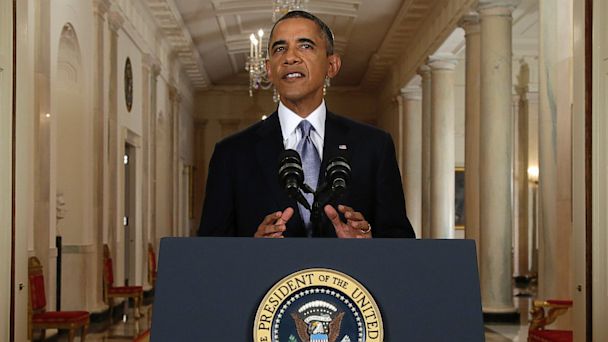Analysis: President Obama Finds Limits of Powers of Persuasion

(Credit: Evan Vucci/Pool/AP Photo)
WASHINGTON - In a debate that's brought strange bedfellows, this is hard to top: President Obama is now hoping that Vladimir Putin saves him from his own Congress.
The president tonight offered virtually no new arguments and little fresh urgency in his push to confront Syria over chemical weapons. The only short-term option is the one supplied by the Russians, in a dizzying series of events that brought quick recalculations on the part of the White House.
The prime-time address underscored the extent to which the president is stuck in a box he constructed. It capped an extraordinary 10-day span during which Obama tested the limits of his own powers of persuasion - and then found them, promptly and uncomfortably.
"I have therefore asked the leaders of Congress to postpone a vote to authorize the use of force while we pursue this diplomatic path," the president said, citing what he called "encouraging signs" in the proposal to rid Assad of chemical weapons.
But the real reason the president doesn't want to go to Congress now is that he can't. A vote on authorizing force against Syria would be defeated handily, weakening the president to a degree the White House can't stomach.
This is the context by which the Russian offer to help rid Syria of chemical weapons looks "encouraging." It will take weeks to play out, and could easy fizzle, but it has the benefit of offering an attractive off-ramp to the Syrians, the Russians, and possibly the Americans now as well.
The president tonight continued to press his case for military action, though with less urgency than he did just days ago. He made clear that in his view, the Assad regime is only budging on chemical weapons because of the threat of American military might.
"What kind of world will we live in if the United States of America sees a dictator brazenly violate international law with poison gas and we choose to look the other way?" Obama asked.
But Obama is trying to make the best of a gamble he lost. Barely a week ago, in calling on Congress to authorize military force yet making clear he didn't need permission, the president declared flatly: "I have decided that the United States should take military action against Syrian regime targets."
The shifting alliances will surely scramble the politics of Syria several more times before the House and Senate have their say - if that ever happens.
For now, though, the president isn't eager to hear Congress' judgment, since he's fairly confident he won't like it. Should diplomacy again fail in dealing with Assad, the president could easily find himself right where he started, with the public still not on his side.